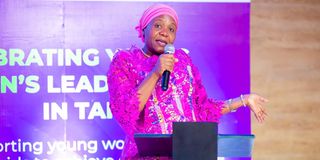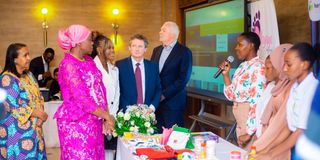Minister condemns mockery of single mothers

The Minister for Community Development, Gender, Women, and Special Needs, Dr Dorothy Gwajima, speaks Dar es Salaam recently at an event that brought together different stakeholders to discuss women and leadership.
What you need to know:
- She noted that many women become single mothers due to circumstances such as widowhood or marital conflict.
Dar es Salaam. The Minister for Community Development, Gender, Women, and Special Needs, Dr Dorothy Gwajima, has condemned people who ridicule women raising children alone—commonly known as single mothers—stating they deserve respect like any other parents.
Dr Gwajima spoke in Dar es Salaam recently at an event organised by the Her Initiative Foundation that brought together different stakeholders to discuss women and leadership.
Addressing stakeholders during the event, Dr Gwajima said negative remarks about single mothers amount to oppression.
She noted that many women become single mothers due to circumstances such as widowhood or marital conflict.
“Anyone promoting such views lacks morals and fails to understand the vital role of mothers in society. Even more concerning is that some members of the community endorse these views. This calls for serious reflection,” she said.
Dr Gwajima dismissed claims that single mothers are unfit parents, stating that many serve as exemplary role models.
She highlighted Tanzania’s progress in gender equality, particularly in leadership, citing an increase in female parliamentary representation from eight percent in 1995 to 35 percent in 2020 However, she noted that many women leaders remain unrecognised despite their contributions. (Mariam Mbwana)
To address this, her ministry, in collaboration with stakeholders, is developing a strategy to identify and promote women making meaningful impacts across sectors.
“We are creating an environment that enables women to thrive as leaders, entrepreneurs, and agents of change. Economic empowerment is key to their participation in society,” she said.
“We will continue ensuring girls and women have opportunities to lead and create a new chapter in history. It is time to break barriers and drive real change,” she added.

The Her Initiative Foundation’s Executive Director, Lydia Charles, emphasised society’s responsibility to support and guide young girls in achieving their ambitions.
“Many young girls have great aspirations; they often struggle to achieve them due to challenges such as poverty,” she said.
“My journey has taught me that talent exists everywhere, but not everyone gets a chance to showcase it. Every girl deserves the opportunity to learn, grow, and fulfill her dreams. By investing in girls, we build a better society,” she added.
Meanwhile, UN Women’s Resident Representative Hodan Addou noted that three decades after the Beijing Declaration, Tanzania has made strides in girls’ education, women’s leadership, and legal protections.
However, she emphasised that women’s empowerment is an ongoing journey and called on society and stakeholders to continue supporting the cause.
“Empowering women is not only crucial for their well-being but also for the progress of society. When you empower a woman, you uplift an entire nation,” she said.
Belgian Ambassador to Tanzania Peter Huyghebaert echoed her sentiment, stressing that gender equality is fundamental to development.
“Tanzania and Belgium will continue working together to promote equal opportunities for women in education, employment, and leadership,” he said.




